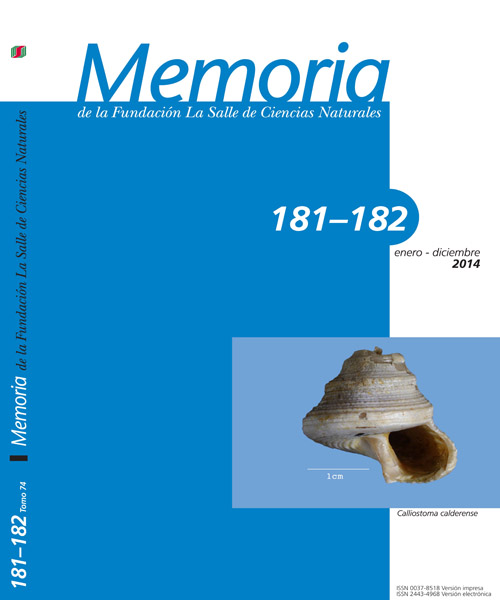Estudio sanitario de áreas de crecimiento y cosecha de moluscos bivalvos en Venezuela
Palabras clave:
Moluscos bivalvos, Agua de mar, Salud pública, Contaminación marina, Coliformes fecales, Bivalve mollusks, Sea water, Public health, Marine contamination, Fecal coliformsResumen
Los moluscos bivalvos son especies filtradoras que concentran los contaminantes presentes en las aguas costeras donde se cosechan; por ello, deben realizarse controles sanitarios durante su cultivo, cosecha y comercialización para evitar que propaguen enfermedades a los consumidores. Este ensayo revisa los programas de vigilancia sanitaria de algunos países, que incluyen también estudios de los cuerpos de agua, junto a la normativa legal venezolana sobre este particular. La delimitación de áreas geográficas, la identificación de fuentes de contaminación y la evaluación de descargas en el agua deben evaluarse y actualizarse periódicamente, ya que influyen tanto en la calidad del agua como en la de los moluscos bivalvos. Así mismo, deben realizarse los estudios correspondientes después de ocurrir fenómenos naturales tales como marea roja, huracanes, tormentas e inundaciones. La información obtenida durante los programas de muestreo sirve de criterio para clasificar, como aprobada o no, a una determinada área de cosecha de moluscos bivalvos. Venezuela, aunque no tiene un programa estructurado de sanidad de moluscos bivalvos como en otros países, posee normativas esparcidas en varios decretos, resoluciones, despachos de ministro y providencias administrativas que regulan el aprovechamiento sustentable y vigilan para que las actividades de cosecha y comercialización se realicen bajo normas sanitarias.
Bivalve shellfish growth and harvesting areas sanitary study in Venezuela
Abstract. Bivalve mollusks are filter-feeding species that concentrate contaminants from the coastal surrounding waters where they are harvested; because of that it is necessary to perform sanitary controls during their growth, harvesting and commercialization to prevent the spreading of diseases to the consumers. This paper reviews the sanitation programs of some countries, including studies of water samples and their analysis, together with Venezuelan laws about this matter. The delimitation of geographic areas, the identification of contamination sources and the evaluation of water discharges must be periodically reviewed and brought up to date because they have influence in the quality of both water and bivalve mollusks. In like manner, corresponding investigations must be performed after natural phenomenon such as red tide, hurricanes, storms and flooding. Data obtained during sampling programs serve as criteria to classify as approved or not a determined shellfish harvesting area. Even though Venezuela does not have a structured shellfish sanitation program like other countries, it has normatives scattered around several decree-laws, resolutions, minister dispatches and administrative judgment that regulate the sustainable exploitation and supervise that the harvesting and commercialization activities are carried out under sanitary norms.
